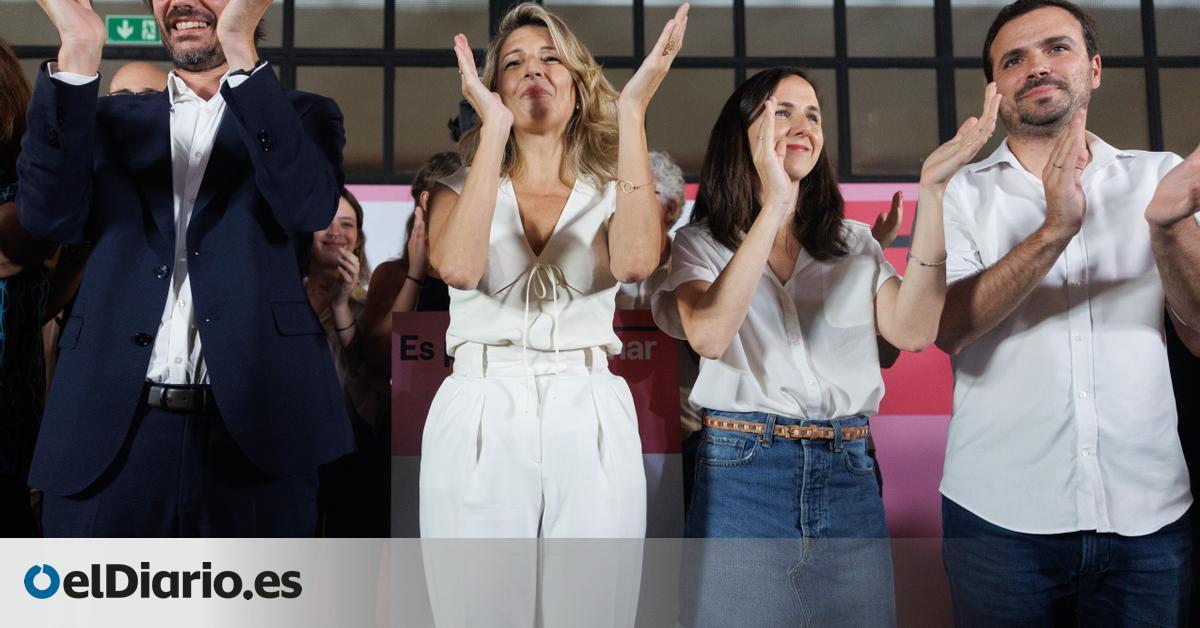
Sumar has definitively begun its journey as the hegemonic political force to the left of the PSOE. The results of the 28M, the negotiations to articulate the coalition of parties and the general elections have resolved for the moment the discussion on the weight of the political formations of that ideological space and Yolanda Díaz must now assume that leadership through two different paths: ensuring the revival of the coalition government and launching Movimiento Sumar as its own political force.
Yolanda Díaz and Alberto Garzón vindicate the results of Sumar in the face of criticism from Podemos
Further
The result of July 23 left Sumar with 31 deputies in Congress and as an indispensable force to repeat a government with the PSOE. That is why Yolanda Díaz called on the same day of the elections to revalidate the coalition. “You already know that I make dialogue out of politics. Starting tomorrow I will start a dialogue with all the progressive and democratic forces and formations to guarantee the government in Spain, ”she promised.
A day later they summoned the Socialists to sit down at a negotiating table. The work progressed in several ways. That day the leader of Sumar began to design the team that will talk with the PSOE delegation, details of which have not been disclosed. On the other, she commissioned Jaume Asens to establish a channel of contact with Waterloo to try to convince Carles Puigdemont that his party, Junts, decide to abstain from a future investiture for which Junts’ seven seats would be decisive.
Although it is true that the PSOE has shown that it is not in a hurry at least until the end of the summer to get down to work, waiting for a possible movement by Alberto Núñez Feijóo to present himself for an investiture with no chance of success, Sumar is already making moves and preparing your platform for a negotiation scenario that on the other hand raises many questions.
Conversations of maximum discretion
Yolanda Díaz advanced in Al Rojo Vivo, which already had an armed team to face those conversations with the socialists. How many members does that team have? Has an agreement been reached with the 15 coalition parties? Do these parties or some of them have representation in that negotiating table? What are the starting points of those conversations? How many ministries does Sumar hope to retain and how would it distribute them?
Some of these issues are those that have already been put on the table by some voices, for example, within Podemos, which this week argued that they would ask to join that negotiating team and that they considered that it would be fair to obtain at least one ministry within the future government and also to choose the person, an issue that had been around the table of the first negotiations between Díaz and Podemos before the launch of Sumar in Magariños.
In Yolanda Díaz’s environment they assure that the talks are being carried out with maximum discretion and that the acting second vice president has met with all the parties that make up the coalition, but the warnings from Podemos show that, beyond the agreement that is reached with the PSOE, the internal distribution will also be a source of tension. It is not a different scenario from four years ago, after Pedro Sánchez and Pablo Iglesias signed the first agreement for a coalition government since the recovery of democracy.
So, the leader of Podemos had to make intense internal balances to satisfy all parties: his party, which had obtained the greatest weight in deputies (23), was left with a vice-presidency and two portfolios, offered the communes another and Izquierda Unida , another two, although those of Alberto Garzón did not consider Yolanda Díaz’s part of their quota, who had resigned from that party months before due to discrepancies with her party precisely because of the negotiations with the PSOE. The distribution at that time was not only ministers. Several Izquierda Unida cadres, for example, entered Podemos portfolios as state secretaries or at the head of directions.
From the 2019 elections, the distribution of Unidas Podemos was approximately as follows: 23 deputies for those of Pablo Iglesias, 4 for Izquierda Unida, 7 for the comuns and 1 for Alianza Verde. This time the decision is more complicated because Sumar has included many more parties in the agreement and the vice president’s own space has become an instrumental force with its own quota. Sumar Movement has 10 minutes; Podemos, Izquierda Unida and the comuns have 5 each; Más Madrid and Compromís have 2; and Chunta and Més with one each.
building a party
While Díaz unravels the knot, he must also begin to think about how to organize a parliamentary group that, once again, will be more diverse than ever. The parties can request, as was the case until now in Unidas Podemos, a deputy spokesperson to be able to divide the time in plenary and hold separate press conferences.
And here Podemos appears again, which advanced this Wednesday, in the mouth of Pablo Echenique, who will exercise “political autonomy” in that future group. Those of Ione Belarra claim their own voice and to be able to detach themselves from voting autonomy on crucial issues as has already happened in this legislature, for example, with Izquierda Unida in the vote on NATO. An autonomy, they argue, like the one that Compromís negotiated when signing the coalition agreement with Sumar.
All this difficult articulation will run parallel to the consolidation of Movimiento Sumar as a new political force in the cosmos of the left. The vice president’s entourage shies away from the term “party” and prefers to speak of a citizen movement, but the truth is that this platform already has that legal form in the registry of the Ministry of the Interior and will have the typical bodies, according to its own statutes. of traditional political organizations.
This week, the spokesman for the Sumar campaign, Ernest Urtasun, announced in an interview in El País that the first constituent assembly of the Sumar Movement would be held after the summer. This assembly is the one that must later develop the internal dynamics of the political project: designate an executive or direction, called the Coordination Board, and a Guarantees Commission. The party will have the figure of a “presidency” currently held by the elected deputy Marta Lois. The future structure will be at the state level and will have two types of militants, the affiliates, with a larger legal entity, and the “friends” of Sumar.
From here many questions arise again. Will the parties that are already part of the coalition be integrated in some way in the future militancy? Will Movimiento Sumar allow double militancy to facilitate this integration? The ductility of the left when it comes to creating new political tools provides several examples. Without going any further, IU is a party federation with its own organic structure. Compromís or the comuns have similar dynamics. Unidas Podemos, on the contrary, never managed to transcend the structure of an electoral and parliamentary coalition in operation.
During the campaign, this newspaper asked several interviewees from Sumar or from its parties about these issues, but none wanted to provide too many details about these extremes, something that the members of the coalition did not advance in private either. This strategic discussion takes place in silence for the moment while the negotiating teams for the project prepare for an autumn in which they will have to multiply to articulate a parliamentary group, a political party and negotiate a possible coalition government.
______________
How to stop the lies
The 23J campaign has made clear the tremendous importance of the free press, which depends on its readers and owes nothing to anyone else. The vast majority of the big media are owned by banks, funds and large communication groups. The vast majority of them have whitewashed the ultras and are under the control of the agenda set by the right.
That is why we ask for your support. We need to grow. Hire more journalists. Reinforce our local editions against the lies of the local and regional governments of the extreme right. Sign more investigative reporters. We need to reach more people, build a bigger newspaper, capable of countering the brutal wave of conservative propaganda that we are going to face. And that will leave small what we have experienced in this dirty electoral campaign.
If you care about the future of this country, support us. Today we need you more than ever because our work is more necessary than ever. Become a member, become a member, of elDiario.es.
Source: www.eldiario.es

